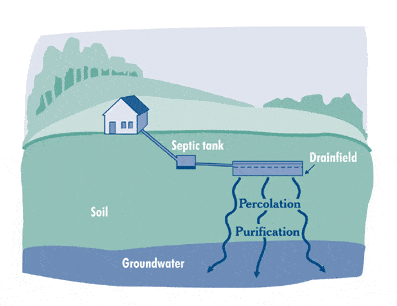Disclosure: This post contains affiliate links, meaning we may earn money or products from the companies mentioned in this post if you purchase a product through one of our links. An example would be Amazon.
How long does a septic inspection take?
Thinking of getting your septic tank inspected? That is great. A septic tank inspection is something you must conduct on a regular basis, as it gives you peace of mind knowing that your septic tank system is working as it should. A regular maintenance also helps fix any minor issue that might be plaguing your tank before it grows into a major problem. Since an inspection does not take a lot of time, nor does a septic tank inspection cost a lot, there is no reason why you should not get your tank inspected regularly. In fact, not investing time and money in septic tank inspections is a huge mistake, which can not only prove costly in the long run but also compromise the health and safety of your family.
So, how long does a septic inspection take? Generally speaking, a septic tank inspection can take anywhere from 45 mins to 2 hours. Keep in mind that this is an approximate rage. How much time an inspection takes depends on many variables, like the size of the septic tank, complexity of the septic tank system, and the on-site findings.
Continue reading to find out what is a septic tank inspection, how long does it take, and what is involved in a septic tank inspection.
Call Septic Service Pros 1.855-925-0760 For Service or Request a Quote
How Long Does a Septic Tank Inspection Take?
Generally, a septic tank inspection should take roughly two hours. But it can take less or more time depending on several factors. If you have a bigger septic tank, the inspection can take more than two hours. Likewise if you have a longer yard, or if some complicated issues crop up during the septic tank inspection, you can expect the inspection to go beyond two hours. That said, it is rare for a septic tank inspection to last more than 3 hours.
If you are a homeowner, it is always a good idea to observe the septic tank inspection. This way you can pick up a lot of important tips on how to properly maintain your septic tank and minimize its risk of developing a complex and expensive issue.
When Do You Need a Septic Tank Inspection?
If you have a plumbing issue, you should get your tank inspected without delay. This is paramount because it will allow you fix the problem before it snowballs into a huge mess.
While this is not a complete list, here are some tell-tale signs that you need a septic tank inspection.
- Pooling water in the yard
- A foul smell in the area
- A lot of vegetation around the septic tank’s location
- The sinks, bathtubs, and toilets draining more slowly than normal
- Sewage water backing up
- A foul smell coming from the drains
The last three signs indicate that your septic tank is full and requires pumping.
Other times you may require a septic tank inspection include the following:
- When you are selling the home
- When you are buying a new house
- Before you start any new construction on the property
In most instances, when you are trying to sell your property, you will have to get the septic tank inspected first. The same is true when you are looking to buy a home with a septic tank system. Also, if you are planning to start new construction on your house, it is a good idea to have your septic tank inspected.
Call Septic Service Pros 1.855-925-0760 For Service or Request a Quote
What are the different types of septic inspections?
Broadly speaking, there are two types of septic inspections.
- Visual inspections – The visual inspection is generally conducted by a home inspector when you sell or buy a house. It includes checking when was the last time the tank was inspected, asking questions related to the property, checking the water pressure, inspecting the drain field, checking for cesspools and standing water, and so on. While a visual inspection does not take a lot of time, it is neither comprehensive nor helpful if you want to know if the septic tank in question is healthy.
- Full inspection – A full inspection is a lot more detailed than a visual inspection. It is conducted by professionals, so if you want a full inspection, you should contact your local septic tank professional service. Septic tank professionals use proper tools and equipment to gauge what is going what is really going on with your septic tank. They will inspect the water level in the tank to ascertain whether or not the water is properly draining. In addition, they will run a few tests to check if your tank is performing exactly as it should before they go ahead with the pumping.
Needless to say, getting your septic tank inspected at regular intervals is very important. You will not only save money, since an inspection can help fix a minor issue before it turns into a big problem, but will also be able to keep your family (and the property) safe and healthy.
How often you should get your septic tank inspected?
Generally, a septic tank needs to be pumped every three to five years, depending on its size and how you maintain it. Having your septic tank inspected on a regular basis can help avoid severe septic tank problems.
While most experts recommend scheduling an inspection every three to five years, you should consider getting your tank inspected more frequently if you have a bigger family, house, or septic tank.
Apart from having your septic tank inspected frequently, you can perform several maintenance steps to keep common septic tank problems at bay. They include avoiding using chemical products for unclogging drains, as they are harmful for bacteria living in the septic tank. It is these microbes that do the all-important job of breaking down the waste material that enters the septic tank.
Also, be mindful of what you send down the drain. Septic tanks are not designed to handle sanitary napkins, egg shells, medications, cooking grease, or coffee grounds. Finally, use septic treatment products on a regular basis. That is because they are efficient at promoting good bacteria and keeping your septic system in good shape.
Why do Septic Tanks Fail Inspection?
Generally, septic tank systems fail inspection due to improper maintenance. That said, there are other reasons as well. A flaw in the design of the septic tank can also lead to a septic tank failure. Sometimes, high groundwater tables, inadequate soil on which the septic tank has been installed, and excessive sloping can also cause contamination and mechanical problems.
Here are some tips that can help ensure your septic tank passes inspection:
- Avoid using harsh chemicals, like bleach
- Do not flood the septic tank system with excessive water
- Address any leakage in the plumbing as soon as possible
- Do not send food and garbage disposable units down the drain
- Commit to routine septic pumping


